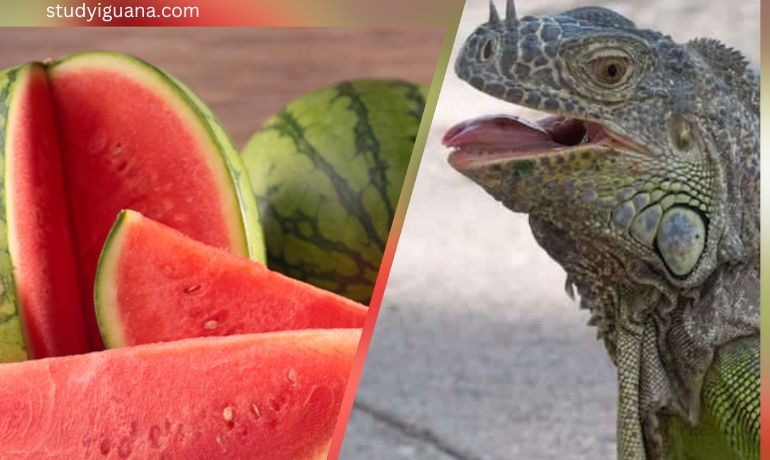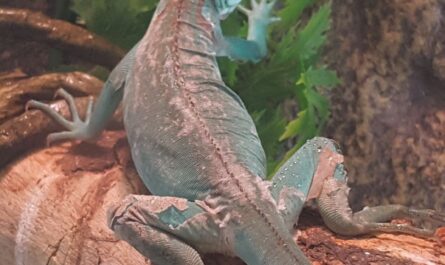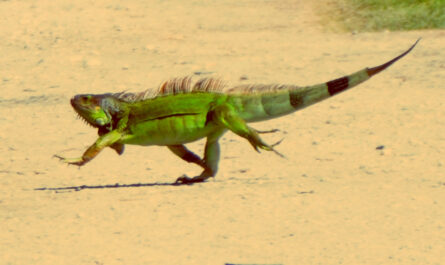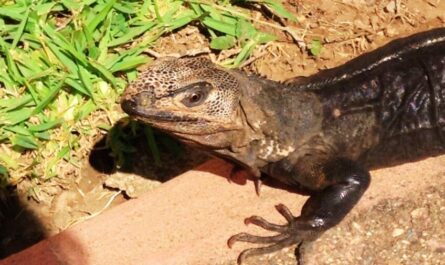can iguanas eat watermelon? Iguanas are fascinating reptiles that are popular pets for many animal lovers. As a responsible iguana owner, it’s important to provide your pet with a balanced and healthy diet to ensure their well-being. One of the questions that iguana owners may have is whether or not their pets can eat watermelon.
Watermelon is a sweet and refreshing fruit that is enjoyed by many humans, but is it safe for iguanas to eat? In this article, we will explore the dietary habits of iguanas, the nutritional content of watermelon, and answer the question: can iguanas safely eat watermelon? By the end of this article, you will have a better understanding of whether or not watermelon is a suitable addition to your iguana’s diet.
Briefly explain what the article is about
The article is about whether or not iguanas can safely eat watermelon. It will explore the dietary habits of iguanas, the nutritional content of watermelon, and any potential risks associated with feeding it to them. By the end of the article, readers will have a better understanding of whether or not watermelon is a suitable addition to their iguana’s diet.
What Do Iguanas Typically Eat?
Iguanas are herbivorous reptiles that typically feed on a variety of fruits, vegetables, and leafy greens. In their natural habitat, iguanas can be found foraging for food in trees and on the ground.
Discuss the dietary habits of iguanas
Iguanas are herbivorous reptiles that primarily feed on fruits, vegetables, and leafy greens. In their natural habitat, iguanas forage for food in trees and on the ground. A healthy iguana diet should be high in fiber, calcium, and other essential vitamins and minerals. Meat and dairy products should not be included in their diet, as their digestive system is not designed to process these foods. Feeding iguanas too many sugary or fatty foods can lead to obesity and other health issues.
Explain what foods are safe for iguanas to eat

Some safe food options for iguanas include:
- Dark leafy greens, such as collard greens, mustard greens, and kale
- Squash, including butternut, acorn, and zucchini
- Bell peppers
- Carrots
- Cabbage
- Broccoli
- Cauliflower
- Fruits, such as strawberries, blueberries, mangoes, and papayas
Emphasize the importance of a balanced diet for iguanas
It’s essential to note that iguanas should not be fed meat or dairy products, as their digestive system is not designed to process these foods. Additionally, feeding iguanas too many sugary or fatty foods can lead to obesity and other health issues.
In summary, offering iguanas a balanced diet that includes a variety of fruits, vegetables, and leafy greens is crucial for their health and well-being. Providing them with the appropriate nutrients will help ensure a long and happy life for your pet iguana.
Nutritional Benefits of Watermelon
Watermelon is a low-calorie fruit rich in vitamins, minerals, and antioxidants. It can provide hydration, immune support, antioxidants, and a small amount of fiber for iguanas.
Describe the nutritional content of watermelon
A single cup of diced watermelon (152 grams) contains:
- Calories: 46
- Carbohydrates: 12 grams
- Fiber: 0.6 grams
- Protein: 1 gram
- Vitamin C: 21% of the daily value (DV)
- Vitamin A: 18% of the DV
- Potassium: 5% of the DV
- Magnesium: 4% of the DV
- Lycopene: 12.5 milligrams
Potential Health Benefits of Watermelon for Iguanas
While watermelon is not a necessary component of an iguana’s diet, it can be a healthy treat option when fed in moderation. Here are some potential health benefits of watermelon for iguanas:
- Hydration: Watermelon is made up of approximately 92% water, making it an excellent source of hydration for iguanas, especially during hot weather.
- Vitamin C: The vitamin C found in watermelon can help support a healthy immune system in iguanas.
- Antioxidants: The lycopene and other antioxidants in watermelon may help protect iguanas from cellular damage and inflammation.
- Fiber: While watermelon is not a significant source of fiber, it does contain some, which can help support digestive health in iguanas.
Overall, watermelon can be a healthy addition to an iguana’s diet when fed in moderation. However, it should not replace the essential fruits, vegetables, and leafy greens that make up the majority of their diet.
Can Iguanas Safely Eat Watermelon?
Yes, iguanas can safely eat watermelon, but only in moderation. Watermelon is not a necessary component of their diet, but it can be a healthy treat option when fed in small amounts. Too much watermelon can lead to digestive upset, diarrhea, or other health issues in iguanas.
Answer the main question posed in the article
While watermelon is a low-calorie fruit that is rich in essential vitamins, minerals, and antioxidants, it is also high in natural sugars. Feeding iguanas too much sugary food can lead to obesity, liver disease, and other health issues.
Explain whether or not iguanas can eat watermelon and how it may impact their health
It’s important to remember that watermelon should not replace the essential fruits, vegetables, and leafy greens that make up the majority of an iguana’s diet. Watermelon should only be fed in small amounts as an occasional treat.
Discuss the potential risks of feeding iguanas watermelon
In summary, iguanas can safely eat watermelon, but it should be given in moderation and as part of a balanced diet. Owners should be mindful of the potential risks of feeding too much sugary fruit to their iguanas and monitor their pet’s health closely.
How to Feed Watermelon to Your Iguana
When feeding watermelon to your iguana, it’s important to take some precautions to ensure their safety and well-being. Here are some tips on how to safely feed watermelon to iguanas:
Provide tips on how to safely feed watermelon to iguanas
- Choose ripe, fresh watermelon: Make sure to select a fresh, ripe watermelon that is free from mold or other signs of spoilage. Avoid feeding your iguana watermelon that has been stored for a long time or has started to go bad.
- Cut the watermelon into small pieces: Cut the watermelon into small, bite-sized pieces that are easy for your iguana to eat and digest. Remove any seeds, as they can be a choking hazard.
- Offer watermelon in moderation: While watermelon can be a healthy treat for iguanas, it should only be fed in moderation. Offer small amounts of watermelon as an occasional treat, and do not make it a regular part of their diet.
- Monitor your iguana’s health: After feeding watermelon to your iguana, monitor their health closely for any signs of digestive upset or other issues. If your iguana experiences diarrhea, vomiting, or other health problems, discontinue feeding them watermelon and consult with a veterinarian.
Appropriate Portion Size and Frequency of Feeding
The appropriate portion size and frequency of feeding watermelon to your iguana will depend on their size, age, and individual dietary needs. As a general rule, watermelon should only make up a small portion of their diet, and should only be offered as an occasional treat.
It’s important to remember that iguanas require a balanced diet that is rich in fiber, calcium, and essential vitamins and minerals. Consult with a veterinarian or reptile nutritionist to determine the appropriate portion size and frequency of feeding watermelon, as well as other fruits and vegetables, for your iguana.
Other Fruits and Vegetables for Iguanas
In addition to watermelon, there are many other fruits and vegetables that are safe and healthy for iguanas to eat. Here is a list of some of the best fruits and vegetables to include in your iguana’s diet:
- Collard greens
- Kale
- Mustard greens
- Dandelion greens
- Squash
- Zucchini
- Carrots
- Green beans
- Peas
- Apples
- Strawberries
- Blueberries
- Mangoes
It’s important to note that iguanas require a varied diet that is rich in fiber, calcium, and essential vitamins and minerals. While fruits and vegetables can be a healthy addition to their diet, they should not make up the majority of their food intake.
Emphasize the importance of a varied diet for iguanas
A varied diet is essential for maintaining the health and well-being of iguanas. In the wild, iguanas have access to a wide variety of foods, including leaves, flowers, fruits, and insects. As pets, it’s important to provide them with a diet that mimics their natural eating habits as closely as possible.

A diet that is too high in protein, fat, or sugar can lead to health problems such as obesity, liver disease, and metabolic bone disease. Feeding your iguana a varied diet that includes a mix of fruits, vegetables, and leafy greens can help to prevent these issues and keep them healthy and happy.
In summary, there are many safe and healthy fruits and vegetables that iguanas can eat in addition to watermelon. Providing a varied diet that meets their nutritional needs is essential for their health and well-being.
Conclusion
By following the tips and guidelines outlined in this article, you can provide your iguana with a safe and healthy diet that includes the occasional treat of watermelon. Remember to always consult with a veterinarian or reptile specialist if you have any concerns about your iguana’s diet or health.
FAQS
Can iguanas eat watermelon seeds?
No, it’s best to remove all seeds from the watermelon before feeding it to your iguana. Watermelon seeds can be a choking hazard or cause digestive problems.
Can iguanas eat the rind of the watermelon?
No, the rind of the watermelon is not safe for iguanas to eat. It is tough and difficult to digest, and may cause digestive problems.
Can iguanas eat other types of melons?
Yes, iguanas can safely eat other types of melons, such as cantaloupe and honeydew. These melons should also be ripe, seedless, and cut into small pieces before feeding to your iguana.
Can iguanas eat other fruits besides melons?
Yes, iguanas can eat a variety of fruits such as apples, bananas, berries, and mangoes. However, it’s important to offer these fruits in moderation and as part of a balanced diet that includes vegetables and leafy greens.
Can iguanas eat meat or insects?
No, iguanas are herbivores and should not be fed meat or insects. Feeding them these foods can cause health problems and disrupt their digestive system.
How often should I feed my iguana watermelon?
Watermelon should be fed to iguanas in moderation, as a treat or supplement to their regular diet. It’s recommended to offer watermelon once or twice a week in small portions, as overfeeding can lead to digestive problems and obesity.
Can watermelon replace my iguana’s regular diet?
No, watermelon should not replace your iguana’s regular diet. It should only be offered in small amounts as a supplement or treat, and should not be the main source of nutrition for your pet.
Additional readings




